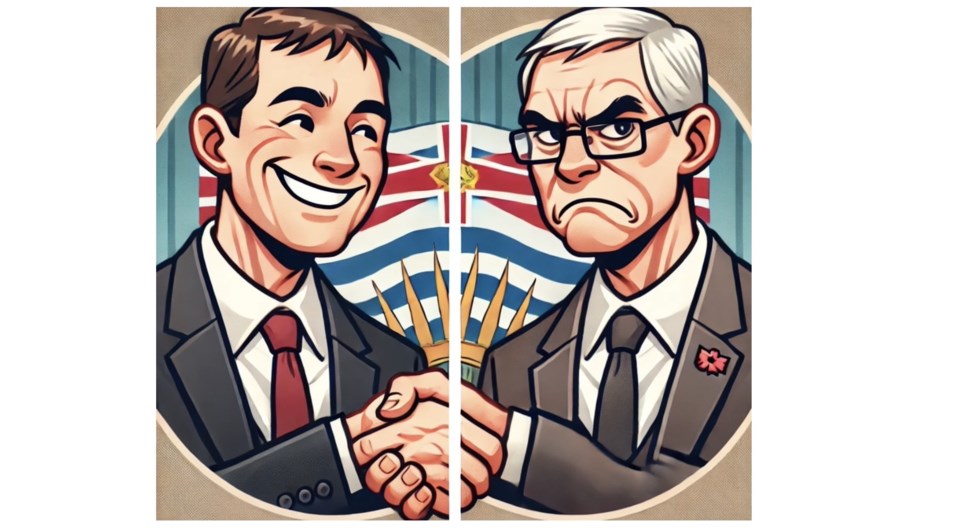Kevin Falcon’s recent decision to suspend BC United’s campaign and endorse John Rustad’s BC Conservatives is a clear sign that British Columbia’s political landscape is becoming more polarized. This move doesn’t just highlight the desire to unite the right-of-centre vote – it signals a shrinking of choices for voters. Instead of offering a range of alternatives that reflect diverse viewpoints, we’re seeing an attempt to consolidate power, which risks returning us to a more divided political environment.
For years, British Columbians have seen a range of voices within the right-of-centre space. The emergence of different parties created opportunities for more nuanced policy discussions and offered voters more choices that aligned with their specific values. But now, with Falcon’s decision to throw his support behind the Conservatives, we’re moving further away from diversity in political representation. This consolidation may be seen as a strategic move to avoid splitting the vote, but it also narrows the political spectrum and limits the options for those who don’t see themselves fitting neatly into a polarized left-right binary.
This trend reflects a broader pattern in politics today, where there is a push to reduce the number of choices available to voters in the name of political expediency. While combining forces might appear to be a pragmatic way to secure a win against the NDP, it also raises concerns about whether this approach will allow for the broad-based, inclusive leadership needed to tackle complex provincial issues like housing, health care and affordability. When parties converge solely to win elections rather than offer diverse policy options, it risks reducing political debate to a binary choice that doesn’t fully address the needs and concerns of the electorate.
For voters, the consolidation of right-of-centre parties may simplify their decision at the ballot box, but it also forces them to confront the reality of a more limited political landscape. With fewer choices, the range of policy options and voices is reduced, potentially stifling important debates on issues that matter most to them. As the election approaches, British Columbians need to consider what this means for their ability to influence government priorities. Do they accept a more polarized environment with fewer options, or do they seek a political culture that encourages a broader range of perspectives and policies that better reflect the complexities of their lives?
Premier David Eby and the NDP now have a unique opportunity to expand their approach and their appeal. With the consolidation of right-of-centre parties, there is a moment for the NDP to reach out to voters who feel left out by the increasingly limited choices. This is a chance for Eby to connect with those who are disillusioned by the current political landscape and to show that his party – under his leadership – can offer a compelling alternative, specifically for those in the centre. By demonstrating a willingness to adapt and grow in response to the evolving political landscape, the NDP can build a bridge to undecided and disillusioned voters, showing that they are not only capable of effective governance but also open to new perspectives and inclusive dialogue. This moment presents a real opportunity for Eby to seize the momentum and appeal to a wider range of British Columbians.
To effectively reach these voters, the NDP will need to create spaces for new conversations where those feeling left out can be heard and find common ground. While Falcon assumes that aligning BC United with Rustad's Conservatives will automatically bring his supporters over without hesitation, the reality is more complex. Many BC United supporters may not see a natural fit with the Conservatives and could be open to considering alternatives.
The decision by Falcon to align with the Conservatives may simplify choices for some voters, but it also narrows the spectrum of voices and ideas that are vital for a healthy democracy. Now, more than ever, we need a political landscape that fosters diverse perspectives and encourages meaningful debate on the real issues that impact all of us.
This is an important election – every election is important. It’s crucial for voters to think carefully about what kind of representation they want and to demand a political dialogue that goes beyond a simple binary choice. This is a chance to push for a more inclusive and dynamic political conversation that truly reflects the complexity of our society. In doing so, we can help ensure that the next government is one that serves all British Columbians, not just those on one side of the political divide.
Katie Shaw, principal, Earnscliffe Strategies, is a public policy and stakeholder engagement specialist.



